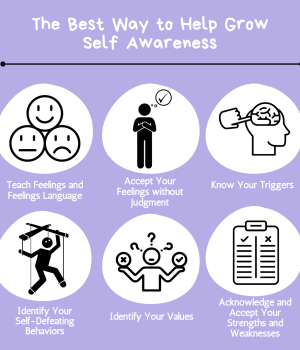Empowering the Next Generation: The Crucial Role of Teen Self-Awareness
Self-aware kids can identify feelings in any given moment and express them appropriately. When our children cannot correctly identify feelings, they can make mistakes with coping behaviors. And often, kids struggle to separate thoughts from feelings. I have had kids in my office who report feeling “like a loser,” “stupid,” or “like punching someone in the mouth.” These are not feelings, but self-judgments and thoughts that can lead to responses that escalate problems. I can’t tell you how many times I have been in a therapy session with a family, where a parent asks, “Why did you hit your little brother?” Invariably the brother will say something like, “Because he was teasing me in front of my friends; He wouldn’t give me the remote; He was wearing my baseball cap!” As I assist the family in peeling back the onion and getting to the core of the issue, we discover that he was hurt and embarrassed by the teasing, frustrated about the remote, and angry about the baseball cap. Because he was unable to identify and express his true feelings, he went right to the thought and his only option became, “hit my brother!” This is just one example of self-defeating behaviors our kids engage in when they are unable to separate thoughts from feelings. Others include skipping classes, substance abuse, procrastination, not asking for help, bullying, yelling and screaming, and isolating with electronics.
To teach your child to be self-aware, you must first develop your own sense of self-awareness. How often do you identify and talk about feelings in your daily routine with your child? Are you OK with anger? Are you OK with your child’s anger? How tuned in are you to your physical states when feeling emotions? Do you know what your personal triggers are? How aware are you of your own self-defeating and default patterns of behavior? What are your values? What are your strengths and weaknesses? Look at the tips below. It may be useful for you to apply them to yourself before you begin working with your child.
- Teach and instill feelings and feelings language
- Accept your feelings without judgment
- Know your triggers
- Identify your self-defeating behaviors
- Identify your values
- Acknowledge and accept your strengths and weaknesses
For more information on raising a self-aware child, see Dr. Hoy’s book, “Mental Fitness for Tweens and Teens.”
Order Here: https://a.co/d/bdBPdFp

Schedule a Free Consultation
Call us to schedule your free consultation.
